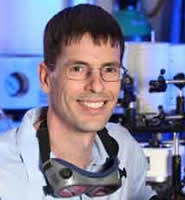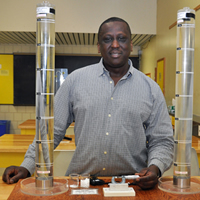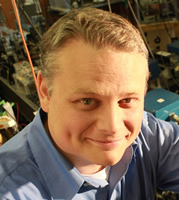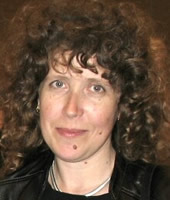 |
C O N F E R E N C E 2014 Thurs May 8 to Sat May 10, 2014 |
 |
Session 22
 |
 |
 |
 |
| James Fraser | Martin Williams | Aaron Slepkov | Tetyana Antimirova |
James Fraser - Queen’s University
|
|||
Bridging the Transition to 1st Year Physics with PER |
|||
As recently as a decade ago, one could confidently walk into a first-year physics classroom in Ontario with a reasonable expectation of the delivered learning experience. Those days are gone. Flipped classrooms, peer instruction, video delivery, tutorial labs, just-in-time-teaching, blended learning, classroom response systems, and a host of other technologies and pedagogical approaches are all now part of the mix along with traditional lecture delivery. The course-delivery landscape is now incredibly diverse. What can you best learn from these changes for your own classroom practices, and how can you best prepare your students for success at the university level? Join this four-person panel, representing both small and large universities, to discuss the origins and meaning of recent changes in first-year physics, as well as a critical discussion of which approaches are likely to stay, and maybe even which new innovations might be coming in the near future. To make the discussion as rewarding as possible, we would appreciate your ideas, questions and comments ahead of time. If possible, please complete the quick (one-question) survey at http://tinyurl.com/OAPT2014 before the conference.
|
|||
James Fraser |
|||
Fraser teaches physics at Queen's, but just spent a year on sabbatical exploring both laser physics (his area of research) and pedagogy research on how best to teach physics at a university level. "My own thoughts on teaching are evolving. We know that certain brains work better with different teaching styles. But with physics there is a strong paradigm of teaching what works for just one type of thinker and that has been a barrier to many. Usually the instructor stands as the expert at the front of the room. I want to see if we can broaden that paradigm." If you pop into one of Fraser's classes, you will see he is doing just that. "Sometimes it might appear to be bedlam in my classroom. The students talk and argue and the instructor wanders among them. But research shows that it is very valuable to have the professor shut up for a while and let the students talk to each other. This is a move to an active learning environment where the instructor is a guide instead of the 'sage on the stage'. I feel the traditional lecture format is limited. In fact, there used to be an old joke that went, 'Traditional lecture is the most efficient way to transmit information from the notes of the instructor to the notes of the students without having to pass through the brains of either of them!' So, while traditional courses have a 20% knowledge gain, active learning doubles this, and stresses more the conceptual understanding in physics than the equation. Overall, the learning experience is richer and retention is better."
|
|||
Martin Williams |
|||
Dr Williams obtained his Ph.D. degree in Experimental Condensed Matter Physics from Imperial College, University of London, United Kingdom in 1993. His doctoral research work was based on quantum transport studies of III-V arsenide and antimonide semiconductor systems, receiving full support as a Commonwealth scholar. He is a chartered Physicist and member of the Institute of Physics. In 1993 Dr Williams joined the department of Physics at the University of Guyana, Guyana, South America as an Assistant Professor where he worked on the design and testing of Solar Flat-Plate Collectors. He served as Head of department from 1993–1996. In 1999 he was the recipient of a Commonwealth Post doctoral Fellowship to pursue work on quantum dot luminescent concentrators for solar cell applications, at Imperial College, University of London, United Kingdom. He joined the Solid State Engineering Group at the University of Nottingham, United Kingdom as a Research Fellow from 2001-2003 and worked on the electrical and RF characterization of III-nitrides for high-speed device applications, a in collaborative venture with the National Research Council, Canada. In 2005 he joined the department of Physics, University of Guelph as a Lecturer, and in 2009 as an Assistant Professor. Dr. Williams has been nominated for TV Ontario’s Best Lecturer Award in 2009 and 2010 in recognition of his impact on students, and passion for teaching. He has served as an Assistant Chief Examiner, Physics, for the Caribbean Examination Council (CXC) Grade 12 Standardized Exams and as a panel member for the curriculum development and implementation of the Caribbean Advanced Proficiency Grade 12 Standardized Examination. Dr. Williams is a former United Kingdom Commonwealth Scholar and Fellow. |
|||
Aaron Slepkov |
|||
Aaron Slepkov is an Assistant Professor and Canada Research Chair in the Physics of Biomaterials, in the department of physics and astronomy at Trent University. He has broad research interests and expertise in nonlinear photonics, biophysics, and ultrafast laser microscopy. Aaron’s interests in physics education research were born in series of casual graduate-student lunchtime seminars in the physics department of the University of Alberta. Since then, he has devoted increasing amounts of time and anxiety thinking about why physics is so universally unpopular among students. He has yet to find a satisfying answer to that question. His current PER research deals with classroom assessments and with developing new assessment tools specifically geared to science education. |
|||
Tetyana Antimirova |
|||
Dr. Tetyana Antimirova is an Associate Professor, a current Undergraduate Program Director at the Department of Physics and a Science Teaching Chair at Ryerson University. Her current interests include Physics Education Research, Curriculum Development, Science Education and Outreach. Her current work is focused on the impact of technology (clickers, real-time data acquisition and analysis, video-based motion analysis, computer simulations and online homework/tutoring systems) on students learning in large introductory physics courses. She also studies the impact of high school physics experience on the learning outcomes in the university introductory physics courses. Tetyana is current OAPT representative to AAPT. Tetyana credits her interest in physics and her career choice to her high school teachers. |
|||